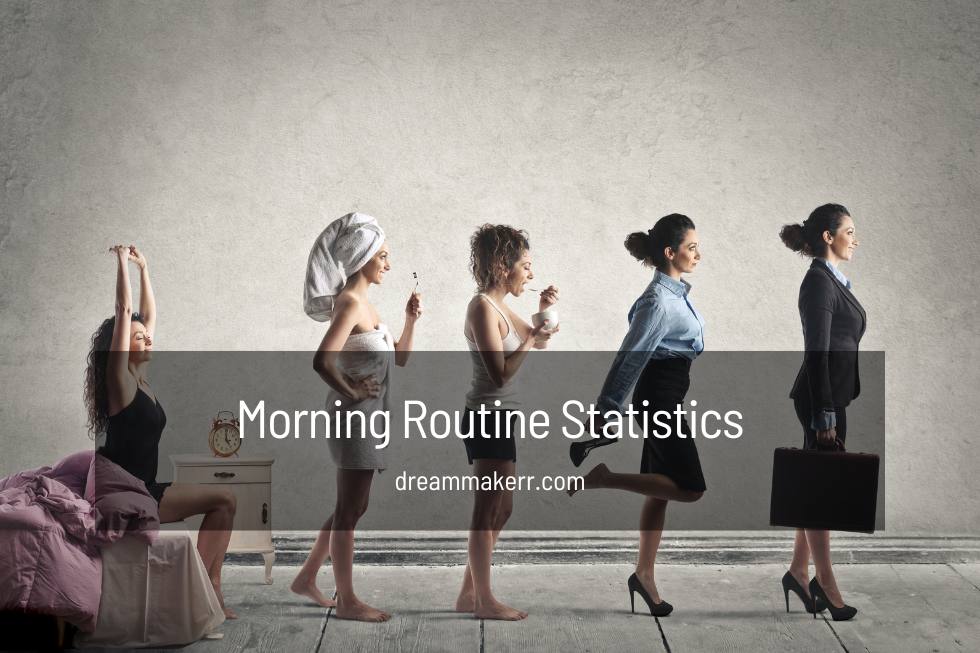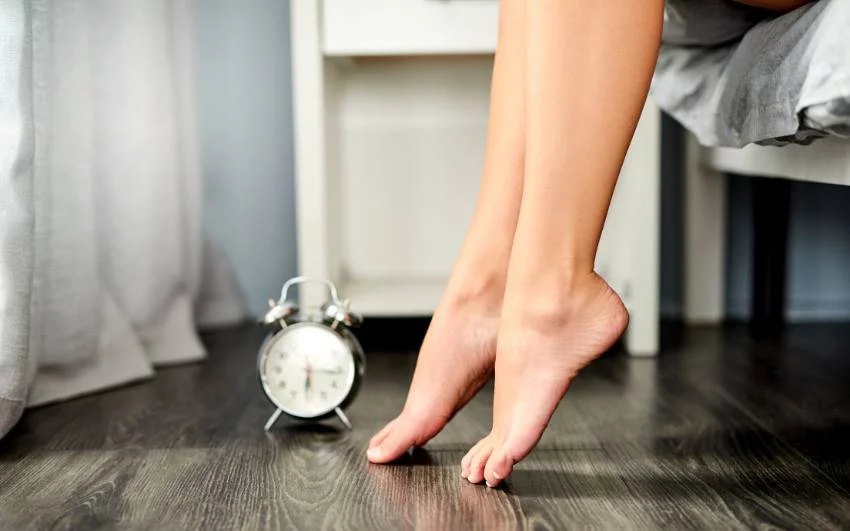On this page

51 Morning Routine Statistics That Make You Stronger, More Productive And Successful
Morning routines statistics that indicate things are going to change significantly over the next ten years.
According to a study by the international market research firm Euro monitor International, in 2022, more than 55% of people will skip breakfast, altogether.
Compared to 2018, when only 28% of people said they skip breakfast, this is a significant change.
What does this indicate about how we should live our lives?
Let’s examine the statistics in more detail to find out.
Do you want to learn more about the daily activities of people?
Look at these morning routine statistics!
These morning routine statistics demonstrate that most people spend roughly the same amount of time on various activities daily. However, there is a lot of diversity in how people spend their free time.
Whether you’re a morning person or a night owl, getting ready in the mornings can be challenging.
Key morning routine statistics waking up
- In the western world, the average person sleeps for seven hours and 29 minutes.
- The typical American rises at 6:23 in the morning.
- 35% of respondents snooze their alarm at least once.
- 63% of respondents say they either meditate or practice some form of yoga, and 79% say they do some light exercise in the morning.
- On weekends, nearly two-thirds of Americans (68%) prefer to sleep in to recharge themselves.
Key morning routine statistics what they do
- According to morning routine statistics, the first thing 71% of people do when they wake up is check their phone.
- 50% of both men and women immediately check their email.
- No matter where they are, 55% can easily maintain their routine.
- 37% of surveyed say they continue their routine even on weekends.
Key statistics getting ready for the day
- 56% of people spend between 11 and 30 minutes preparing
- Only 2% take under five minutes, and 3% take over an hour
- There are more women than men who take this long to get ready, with 21% of men taking over 30 minutes, compared to 38% of women
- It could be because 32% of women use makeup frequently, and 16% do so daily
- In contrast, 33% of women only wear makeup on special occasions, while 15% never wear any
- Only 2% of people with a high school diploma or less education take longer than 10 minutes, while 4% of college graduates take longer than an hour
Summary of main morning routine statistics
- The Harvard Business Review reports that 97% of people have a morning routine.
- Highly productive people (92%) are likelier to have a set morning routine.
- According to 43% of Americans, drinking coffee is the most significant part of their morning routine, followed by working out (32%) and taking a shower (26%).
- More than 4 in 10 people said they experience less stress when they get a good night’s sleep.
A Morning Routine: What Is It?

A lot of people hate mornings.
While some of you might be able to jump out of bed and start working on your tasks, the majority of us find it difficult. You need to establish a good daily routine so mornings don’t have to be unpleasant.
There are many benefits to having a daily routine and a morning routine.
From the moment you awake, your mind is constantly filled with everything you need to do. It might seem so overwhelming that you waste time.
For instance, a morning routine entails repeating the same fundamental tasks in the same sequence each day.
Are you setting yourself up for success right from the start of the day?
You will be prepared for a successful day by the routine habits you establish.
The secret to success might not be as elusive as you think, regardless of whether your goals are to:
- increase productivity
- improve your health
- start each day in a better mood
The benefits of developing a successful morning routine are well known.
Making your morning routine can help you achieve your goals, regardless of whether you want to try some of the more extreme morning activities of the super-rich or famous.
The benefits of establishing and adhering to a morning routine might be more critical than ever.
People who continue to work remotely or in a hybrid environment may need help to keep up with even the most fundamental morning routines.
When it’s simple to press the snooze button a few more times and get out of bed when your day should start, you might be doing more damage than you realize to your energy and cognitive function.
To avoid following trends, we polled Americans about their current morning routines and the ones that work for them.
We’ll discuss which morning activities make people feel the most productive throughout the day, which morning activity people consider to be the most important, and how our morning routines may affect other factors (such as job satisfaction and home cleanliness).
Establish an efficient morning routine by using these examples.
- Oprah Winfrey rises before 6 a.m. (even though she doesn’t use alarm clocks) to walk her dogs, whereas Jennifer Aniston wakes up at 4:30 a.m. to drink hot water with lemon.
- A survey of more than 1,000 people found that 7 out of every 8 people follow a set morning routine.
- Those who had a morning routine were also more likely (92%) than those who did not (79%) to describe themselves as highly productive.
- What morning routines have people adopted most frequently since the COVID-19 pandemic?
- 49 percent of those polled check their phones immediately after waking up, followed by drinking water (42%), consuming coffee (42%), and taking a shower (37%).
- While it may be tempting to check your email or social media first thing in the morning, mainly if your phone also acts as an alarm clock, studies show that early-morning phone use can lower stress levels and attention spans.
- In the morning, those who said they checked their phones first were more likely to report being unproductive (53%).
Although drinking water soon after waking up was associated with drinking coffee, it has been discovered that drinking water in the morning improves mood and cognitive function.
Naturally, feeling productive in the morning involves more than just accomplishing more work.
Nearly a third of people who said they were highly influential in the morning spent their mornings tidying up the house and starting their daily chores, like laundry or feeding the dogs.
Advantages of a successful morning routine
Many people think a hot cup of coffee is a good morning sign.
It may be tempting to gravitate toward the most potent source of caffeine in your life, especially if you don’t always wake up feeling alert and ready to go, but this isn’t always in your best interests.
Coffee consumption is unhealthy like everything else, but drinking it first thing in the morning increases cortisol, which may harm hormone balance, weight, and gut health.
- A recent survey found that people’s morning routines are most vital for them to have coffee, followed by exercise (32%) and a shower (26%).
- Coffee is a crucial part of many people’s morning routines, according to 48% of the less productive and 53% of those unhappy in their jobs.
- For those who felt highly productive (68%), were satisfied with their jobs (75%), and had a spotlessly clean home (69%), exercise was the most common part of their morning routines.
- If you’re thinking about exercising first thing in the morning to burn calories, you’ll get more benefits than a slimmer waistline. Exercise has been shown to increase people’s alertness, vigor, and focus, especially in the morning.
- Two-thirds of respondents said they had low levels of Stress when they first woke up, with taking a shower first thing in the morning (47%) being more relaxing than working out (41%) or drinking coffee (43%).
Most respondents who checked their phones immediately reported feeling highly stressed.
You are positioning yourself for achievement.
Setting up a productive morning routine may involve doing things before you go to sleep as well as after you get out of bed.
- More than 2 in 5 respondents reported lower stress levels, and 44% said they always or frequently planned out their morning routine the night before.
- 75% of those who finished their morning tasks before turning them in said they were happy with their work
- 60% thought they were productive
- 55% said their house was tidy
How can you start the next day off right before you go to sleep?
The most typical morning routines to prepare for include:
- Alarm clock setting (63%).
- Organizing or getting ready for what to wear the following day (40%).
- Looking at the calendar for the next day (32%).
- Packing a lunch (26%) and setting up the coffee maker (26%).
Compared to those earning less than $66,000 (45%), those earning $66,000 and over (49%) were more likely to always or frequently get ready for their mornings the night before.
Optimizing your time
To maximize your day, you should have a morning routine. Our study shows that the morning routines you establish can make you feel more productive throughout the day, make you happier at work and less anxious, and help you get more done around the house.
When you get out of bed, think about taking a shower or taking a quick walk around the block rather than reaching for the coffee cup.
Exercise will give you more energy throughout the day and improve your cognitive function.
Morning Routine Methodology and Its Drawbacks
About morning routine statistics, the methodology and it’s downsides.
We surveyed 1,016 people to learn more about their daily routines. 53% were men, 46% were women, and 1% did not respond.
The respondents’ ages ranged from 24 to 64, with a 38-year-old average.
For brief, open-ended inquiries, outliers were eliminated. To ensure everyone took the questionnaire seriously, they had to recognize and correctly answer an attention-check question.
These statistics are only exploratory and are based on respondents’ self-reports. Self-reporting can be problematic because it can result in exaggeration, biased attribution, selective memory, telescoping, and bias.
All values are open to interpretation.
Fair use declaration
Do you already have an idea of what needs to get done tomorrow? Share this research with your readers for noncommercial purposes as long as you provide a link to this page so they can see the full scope of our findings and survey design.
Benefits of a Morning Routine Supported by Science
A planned morning is important for your physical and mental health according to morning routine statistics.
1. Get Ready for the remainder of your day
As soon as you wake up, your day starts to take shape. If you begin to feel rushed or lazy, be prepared for it to last the entire day. On the other hand, a morning ritual helps you stay on track from the moment you wake up and puts you in the right frame of mind.
2. Become More Productive
You start your day off right with a morning routine. From the moment you wake up, you spend every minute of your day doing something worthwhile and productive.
Maintaining this frame of mind will help you waste as little time as possible. You can focus better and are more likely to complete tasks than to start many things and then abandon half of them. When your job is done, you’ll know you’ve accomplished everything you could during the day and can relax without worry at night. See also productivity statistics.
3. Experience Control
You might feel you’re rushing from one activity to the next when you have a lot of commitments. Instead of the other way around, you become dominated by your day. For instance, a morning routine takes up only a tiny portion of your day, but it is a step in the right direction.
4. Reduce Stress
You may experience Stress if you believe you don’t have enough time to finish all of your obligations or if you worry about what needs to be done next. When there is a routine, you are entirely aware of what you should be doing and what will happen next. You might follow your method without giving it a second thought. Additionally, you’ll be aware that you can take your time and have plenty of time to complete everything.
Reducing Stress is suitable for both your physical and emotional well-being. Your risk of contracting illnesses like high blood pressure, heart disease, diabetes, and conditions like depression and anxiety may be reduced.
5. Establish Healthful Habits
Many of us might discover that we skip our morning routines. It’s simple to procrastinate getting out of bed by pressing the snooze button or staying on your phone. Having a pattern makes it simpler to develop both unhealthy and beneficial habits. You could begin your day by eating a filling breakfast, engaging in mindfulness exercises, or even scheduling some exercise time before leaving for work.
Your other activities will continue to be influenced by healthy behaviors. These healthy habits may cause you to eat better, exercise more frequently, or spend less time on your phone.
6. Increase Your Energy
Due to their lack of energy in the morning, many people dislike them. A morning routine is remarkable because it may increase your power, especially if you schedule no time for laziness and give your planned activities all your focus.
Exercise vigorously, practice meditation, or take a cold morning shower for an extra energy boost.
7. Strengthen Connections
Your connections may be affected by how you carry out everyday tasks like getting out of bed and going to work. One of the most important is reducing Stress. You might vent your resentment on them even if they are unrelated to your issues. Lowering your stress level makes you less likely to lose your temper.
A consistent morning routine will also make it easier for you to be more approachable with your family, which is crucial for fostering more robust relationships. If you’re well-organized, you’ll have more time to spend with your loved ones.
Creating a morning routine is essential for improving your relationships with others. If your family or roommates are aware of your schedule in advance, they will be able to accommodate you. There won’t be any arguments about who gets to use the bathroom first or problems if multiple people are cooking simultaneously.
8. Prevent Forgetting
The likelihood of forgetting something is significantly lower when you follow the same daily routine. You won’t give getting ready for work a second thought. You’ll unlikely realize you forgot something at home when you get to work. There will also be less chance of you failing to perform a necessary task, like emptying the trash or closing the bedroom door so your dog doesn’t sleep on your bed.
9. Increase Your Self-Belief
When you’re calm, and at ease, it’s simpler to feel more confident. Furthermore, better time management will lead to more success and improve your self-esteem.
Finally, giving yourself enough time to take care of yourself in the morning can help you feel better about yourself. When you set aside some time specifically for taking care of yourself, there’s no need to rush. You can take your time doing your hair and choosing outfits that make you feel great.
Read more: believing in yourself
10. Develop Flexibility
Your day starts after your daily routine. It’s common for things to go differently than planned. As a result, you must adapt. While maintaining a morning routine is lovely, you’ll also need to develop some flexibility in case something unforeseen occurs. Changing your morning routine to account for such situations will teach you to be at ease all of the time.
How to Establish a Morning Schedule
A morning routine is easy to establish. Create a brief schedule for the morning that should begin with your awakening. Try out different event sequencing to see which suits you the best.
Do you require inspiration for your daily schedule?
Here are some examples of successful people’s morning routines
Take some of these people’s morning habits into consideration.
1. Tony Robbins: Cold Pool
As we previously mentioned, a cold shower is fantastic for increasing your energy levels throughout the day. Tony Robbins, a life coach, goes one step further and jumps into a 57-degree pool for a “significant change in temperature.” You can achieve the same outcome if you don’t have access to a plunge pool but do have a cold shower.
2. Tim Draper: Shoot hoops
A venture capitalist claims that Mr. Draper starts each day with a basketball game. He asserts that after an action, endorphins are released. Before beginning his day, he takes an hour’s nap to stave off hunger and maintain focus.
3. Muhammad Ali: Read Motivating Materials
Muhammad Ali, a boxer, would start each day with motivational sayings. He reasoned that repeatedly reading the same affirmations would alter his beliefs, leading to a change in his behavior and state of mind. To prepare yourself for success, you could follow suit.
4. Meditation by Dr. Nick Zyrowski
Dr. Nick Zyrowski rises 30 minutes earlier than the rest of his family to meditate. He can set goals for the day because he is in the right mindset.
5. Elle Russ: Insight
One of the most well-known female authors in the world, Elle Russ, understands the value of a morning ritual and starts her mindfulness practice before going to sleep. She stretches and gives thanks for her body and her well-being. She then chooses a daily objective and says it out loud to ensure it is clear.
6. Payal Kadakia: Connect with Your Loved Ones
The founder of LifePass, Payal Kadakia, always converses with her spouse before leaving for work. Even traveling, she tries to get in touch with him. It guarantees that, despite everything else she has going on, her connection always comes first.
7. Arianna Huffington: Put away the phone
Avoiding time-wasters during your morning routine is also essential. The co-founder of the Huffington Post, Arianna Huffington, never checks her phone first thing in the morning. Instead, she sets an objective for her day and begins it with a clear head and a grateful heart.
No question that is planning your morning is advantageous; however, you must consider the scientific benefits of a morning routine to be persuaded. Furthermore, it doesn’t need to be overly complicated, as you can see from the morning routines of famous people. What is the best thing about having a habit, though? You can begin one right away! Create a morning routine for yourself, then start it the following day.
Once your morning routine is established, you should concentrate on creating a successful daily routine and other areas of your life that need to be improved.
You might take the next step of improving your work-life balance.
Conclusion
- Euro monitor International predicts that in 2022, more than 55% of people will skip breakfast, compared to the current 28%.
- This change indicates a need for examination of how we should live our lives.
- The first thing 71% of people do when they wake up is check their phone.
- 50% of both men and women immediately check their email.
- No matter where they are, 55% can easily maintain their routine.
You now know some crucial morning routine statistics.
Establishing a successful morning routine can prepare you for the rest of the day.
Maintaining a healthy work-life balance also requires having a great daily routine.
What actions can you take to make your daily routine better?
- Get up earlier, give yourself some alone time to unwind, and prepare for the day.
- Create a list of the tasks you must complete each day and make every effort to follow them.
- Schedule your time, so you are not constantly rushed or under pressure.
- Take breaks to eat, drink water, and stretch throughout the day.
- Discover a pastime or activity that you enjoy and that unwinds you.
- Ensure you get enough sleep each night to feel rested and energized.
Recommended reading:
Remote work productivity statistics

Petri Maatta is a mindset coach and neuroscience-focused author with 15 years of experience in personal transformation and success psychology. After seven years of business failures, he discovered the power of manifestation through a Fortune 500 mentor. Now, he shares neuroscience-backed strategies through DreamMaker membership, helping others transform their businesses and lives on their own terms.
Read My Story here.
Share This Story, Choose Your Platform!
You want to manifest a new car, but you’re wondering: Does this really work? Here’s
Many smart individuals are often linked with having a high IQ. However, according to emotional
According to online dating statistics over 90% of people believe in love at first sight,




